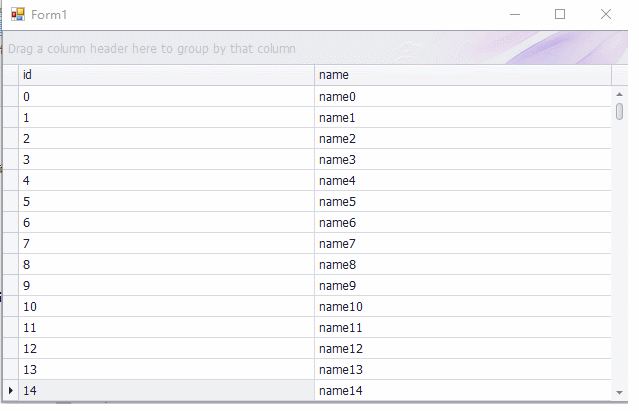
The latest winform project uses DevExpress controls, so I have been exploring the use of this set of controls recently. I really admire the power of the entire set of controls, and the code is also simple to write. The customer has a requirement, hoping that the report results can be scrolled regularly on an external large screen. The control we use for this report is the GridControl. The query results cannot be displayed completely on one screen. We add a timer and specify the time for the GridView to automatically scroll and display the information on the next screen.
But when I saw the code implemented by my colleague, I felt a little uncomfortable. His approximate code is as follows:
/// <summary>/// 当前的行索引/// </summary>private int currentRowHandle = 0;
/// <summary></summary>
/// 总共含有的行
///
private int totalRowCount = 0;
/// <summary>/// 定时器定时事件/// </summary>private void timerScroll_Tick(object sender, EventArgs e)
{ if (currentRowHandle == totalRowCount)
currentRowHandle = 0; else {
currentRowHandle += 40; if (currentRowHandle > totalRowCount)
currentRowHandle = totalRowCount;
}
gridView1.FocusedRowHandle = currentRowHandle;
}In order to realize the automatic scrolling function of GridView, the code introduces 2 fields, and hard-codes the number of rows for each scroll to 40. When the form When scaling with the size of the control, it is possible that 40 rows of data cannot be displayed on one screen, and some data may never be displayed.
By consulting the DevExpress manual, I found that GridView already provides methods that can be used directly to achieve the effect of scrolling pages, and the code is as simple as ever, without introducing any fields. The improved code is as follows:
/// <summary>/// 定时器定时事件/// </summary>/// <param>/// <param>private void timerScroll_Tick(object sender, EventArgs e)
{ if (gridView1.IsLastRow)
{
gridView1.MoveFirst();
} else {
gridView1.MoveNextPage();
}
}
The above is the detailed content of Implement the automatic scrolling function of GridView. For more information, please follow other related articles on the PHP Chinese website!
 ie shortcut cannot be deleted
ie shortcut cannot be deleted
 How to solve the problem that IE shortcut cannot be deleted
How to solve the problem that IE shortcut cannot be deleted
 How to open bin file
How to open bin file
 How to open the registry
How to open the registry
 cookie
cookie
 What are the seven principles of PHP code specifications?
What are the seven principles of PHP code specifications?
 Which platform is better for virtual currency trading?
Which platform is better for virtual currency trading?
 The difference between ms office and wps office
The difference between ms office and wps office




